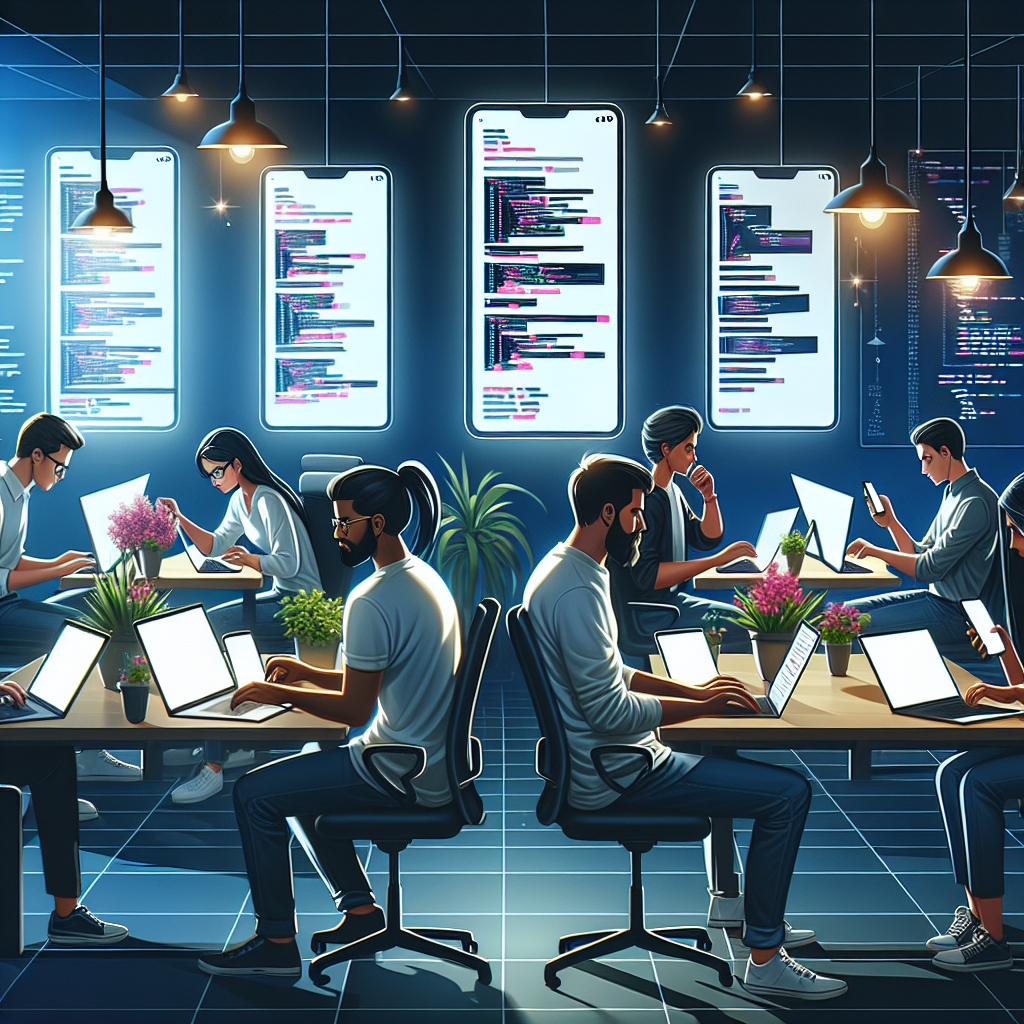What Are Mobile App Development Used For? Find Out Here!
In today’s digital age, mobile app development has become a cornerstone of innovation and convenience. It has fundamentally transformed the way we interact with technology, bridging the gap between users and services across various industries. From enhancing customer engagement to streamlining business operations, mobile apps are used in a multitude of ways, each tailored to meet specific needs and solve unique problems.
The versatility of mobile apps is what makes them so invaluable. Whether you’re looking to build an app for e-commerce, social networking, or healthcare, the possibilities are virtually endless. Businesses can leverage mobile apps to improve their customer service, offer personalized experiences, and gather insightful data to make informed decisions. On the other hand, users benefit from the convenience and efficiency that mobile apps bring to their daily lives.
When considering what are mobile app development used for, it’s important to recognize their role in not just meeting current demands but also in anticipating future trends. For example, the integration of artificial intelligence and machine learning into mobile apps is setting the stage for more intuitive and personalized user experiences. The rise of technologies like augmented reality and blockchain are further expanding the scope of mobile app functionalities, making them indispensable tools in both personal and professional settings.
If you’re interested in harnessing the power of mobile app development for your business, don’t hesitate to get a free quote from our team of experts at NS804. We specialize in creating custom mobile solutions that cater to your specific needs and help you stay ahead in the competitive market.
Business Solutions Through Mobile Apps

Mobile apps have revolutionized the way businesses operate, offering a plethora of solutions that enhance efficiency, productivity, and customer satisfaction. From small startups to large enterprises, companies are increasingly relying on mobile applications to streamline their processes and stay competitive in a fast-paced market.
One of the most significant advantages of mobile apps in business is their ability to improve customer engagement. With features like push notifications, in-app messaging, and personalized offers, businesses can maintain a direct line of communication with their customers, fostering loyalty and encouraging repeat business. Additionally, mobile apps provide valuable insights into customer behavior through analytics, enabling businesses to tailor their strategies and offerings accordingly.
Another critical aspect is the enhancement of operational efficiency. Mobile apps can automate various tasks such as inventory management, order processing, and customer support, reducing the workload on employees and minimizing the risk of human error. For instance, a retail business can use a mobile app to manage stock levels in real-time, ensuring that they are always adequately supplied to meet customer demand.
Furthermore, mobile apps facilitate better collaboration and communication within the organization. Employees can access important information, share documents, and communicate with colleagues regardless of their location, making remote work more feasible and productive. Project management apps, for example, allow teams to track progress, assign tasks, and meet deadlines efficiently.
In summary, mobile apps offer a wide array of business solutions that not only enhance customer experience but also improve internal processes. By leveraging the power of mobile technology, businesses can achieve greater agility, adaptability, and success in their respective industries.
Entertainment and Gaming Applications
Mobile apps have significantly transformed the entertainment and gaming industries, providing users with immersive and engaging experiences that were once confined to traditional media and gaming consoles. The convenience of accessing a wide range of entertainment options directly from a smartphone or tablet has made these applications immensely popular.
Entertainment apps encompass various categories such as streaming services, social media platforms, and digital content libraries. Streaming apps like Netflix, Hulu, and Disney+ allow users to watch movies, TV shows, and exclusive content on-demand, offering unparalleled convenience and flexibility. Similarly, music streaming services such as Spotify and Apple Music provide access to vast libraries of songs, albums, and playlists, ensuring that users can enjoy their favorite tunes anytime, anywhere.
The gaming sector has also seen a dramatic shift with the advent of mobile gaming apps. These applications cater to a diverse audience, ranging from casual gamers to hardcore enthusiasts. Titles like Candy Crush, PUBG Mobile, and Fortnite have garnered millions of downloads, demonstrating the widespread appeal of mobile gaming. These apps often incorporate features like in-app purchases, multiplayer modes, and regular updates to keep players engaged and invested in the game.
Moreover, mobile gaming apps leverage advanced technologies such as augmented reality (AR) and virtual reality (VR) to provide unique and interactive experiences. Games like Pokémon GO and Harry Potter: Wizards Unite utilize AR to blend the digital and physical worlds, creating captivating gameplay that encourages exploration and social interaction.
In addition to entertainment and gaming, mobile apps also serve as platforms for content creators and influencers. Social media apps like TikTok, Instagram, and YouTube enable users to create, share, and monetize their content, reaching a global audience and building personal brands.
Overall, mobile apps have revolutionized entertainment and gaming by offering accessible, engaging, and innovative experiences that cater to a wide range of interests and preferences.
Health and Fitness Mobile Applications

The health and fitness sector has seen a tremendous boost from the advent of mobile applications, making it easier for individuals to monitor and improve their well-being. These apps offer a wide range of functionalities that cater to various aspects of health, from physical fitness and nutrition to mental well-being and medical management.
Fitness apps are among the most popular in this category. Applications such as MyFitnessPal, Fitbit, and Nike Training Club provide users with tools to track their workouts, monitor their progress, and set fitness goals. These apps often include features like workout videos, personalized training plans, and social communities to keep users motivated and engaged. The integration with wearable devices allows for real-time data tracking, giving users detailed insights into their physical activities and health metrics.
Nutrition and diet apps also play a crucial role in promoting a healthy lifestyle. Apps like Lose It!, Yummly, and Fooducate help users track their calorie intake, plan meals, and make healthier food choices. They offer extensive databases of food items, nutritional information, and even barcode scanning for quick logging. Some apps provide personalized meal plans and recipes tailored to specific dietary needs and preferences.
Mental health and well-being are equally important, and mobile apps have made significant strides in this area. Meditation and mindfulness apps like Headspace, Calm, and Insight Timer offer guided meditations, stress-relief exercises, and sleep aids to help users manage stress and improve their mental health. These apps often feature soothing music, nature sounds, and expert advice to create a calming environment conducive to mental well-being.
Moreover, medical management apps like Medisafe, MyChart, and HealthTap assist users in managing their health records, medication schedules, and doctor appointments. These apps can send reminders for medication, track symptoms, and provide access to telemedicine services, making healthcare more accessible and manageable.
Overall, health and fitness mobile applications have revolutionized personal health management by providing accessible, user-friendly tools that empower individuals to take control of their well-being. With a focus on holistic health, these apps cater to a wide range of needs and preferences, making it easier for users to lead healthier, more balanced lives.
Educational and E-Learning Platforms

Mobile applications have revolutionized the education sector by making learning more accessible, interactive, and personalized. With the rise of e-learning platforms, individuals of all ages can now access a wealth of knowledge and educational resources at their fingertips, anytime and anywhere. These apps cater to a wide range of educational needs, from early childhood education to professional development and lifelong learning.
E-learning platforms such as Khan Academy, Coursera, and Udemy have democratized education by offering courses from top institutions and experts across various fields. These apps provide video lectures, reading materials, quizzes, and assignments that enable users to learn at their own pace. Many of these platforms offer certificates and degrees upon course completion, which can enhance career prospects and professional growth.
Language learning apps like Duolingo, Babbel, and Rosetta Stone have made learning a new language more engaging and effective. These apps utilize gamification techniques, interactive exercises, and real-world scenarios to help users build vocabulary, improve pronunciation, and practice conversational skills. The bite-sized lessons and daily challenges keep users motivated and committed to their language learning journey.
For younger learners, educational apps like ABCmouse, Khan Academy Kids, and PBS Kids provide a fun and interactive way to develop foundational skills in reading, math, science, and more. These apps feature colorful graphics, engaging animations, and interactive activities that make learning enjoyable and effective for children. Parental controls and progress tracking features ensure a safe and productive learning environment.
Additionally, mobile apps have transformed professional development and skill-building. Platforms like LinkedIn Learning, Skillshare, and Pluralsight offer courses on a wide range of topics, from coding and digital marketing to leadership and personal development. These apps provide users with the flexibility to learn new skills and advance their careers at their own pace, often through a subscription model that grants access to a vast library of courses.
Furthermore, educational apps often incorporate social and collaborative features that enhance the learning experience. Discussion forums, peer reviews, and group projects enable users to connect with fellow learners, share insights, and collaborate on assignments. This sense of community and interaction fosters a more engaging and supportive learning environment.
In summary, educational and e-learning mobile applications have transformed the way we acquire knowledge and skills. By offering flexible, interactive, and personalized learning experiences, these apps empower users to pursue their educational goals and continue their learning journey throughout their lives.
E-Commerce and Shopping Applications

E-commerce and shopping applications have fundamentally changed the way consumers shop and businesses operate. These apps provide a convenient, efficient, and personalized shopping experience, allowing users to browse, compare, and purchase products from the comfort of their homes or on the go. With the rise of mobile commerce, businesses can reach a broader audience and offer a seamless shopping experience that drives customer loyalty and sales.
Popular e-commerce platforms like Amazon, eBay, and Alibaba have set the standard for mobile shopping. These apps offer a vast selection of products across various categories, from electronics and fashion to groceries and home goods. Advanced search functionalities, personalized recommendations, and user reviews help shoppers make informed purchasing decisions. Additionally, features like one-click purchasing, secure payment options, and fast shipping enhance the overall shopping experience.
Beyond the global giants, numerous niche e-commerce apps cater to specific markets and consumer preferences. For instance, apps like Etsy focus on handmade and vintage items, while Poshmark and Depop target the fashion resale market. These specialized platforms create unique shopping experiences that resonate with their target audiences and foster a sense of community among buyers and sellers.
Mobile apps have also empowered brick-and-mortar retailers to expand their reach and offer an omnichannel shopping experience. Retailers such as Walmart, Target, and Best Buy have developed robust mobile apps that integrate online and in-store shopping. Features like inventory checks, curbside pickup, and mobile payment options bridge the gap between physical and digital retail, providing customers with greater flexibility and convenience.
Moreover, e-commerce apps often incorporate innovative technologies to enhance the shopping experience. Augmented reality (AR) features allow users to visualize products in their homes before purchasing, while AI-driven chatbots offer personalized customer support. Loyalty programs, push notifications, and targeted promotions help businesses engage customers and drive repeat purchases.
For small businesses and individual entrepreneurs, mobile apps like Shopify, WooCommerce, and BigCommerce offer user-friendly platforms to set up and manage online stores. These apps provide tools for inventory management, order processing, and analytics, enabling businesses to operate efficiently and scale their operations. Integration with social media platforms further extends their reach and attracts potential customers.
As mobile commerce continues to evolve, businesses must stay ahead of trends and leverage the latest technologies to provide a compelling shopping experience. Whether you are an established retailer or a budding entrepreneur, embracing mobile app development can significantly enhance your e-commerce strategy and drive growth.
Ready to take your e-commerce business to the next level? Get a free quote from NS804, your trusted partner in custom mobile app development.





Leave a Reply
Want to join the discussion?Feel free to contribute!